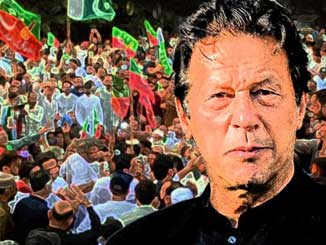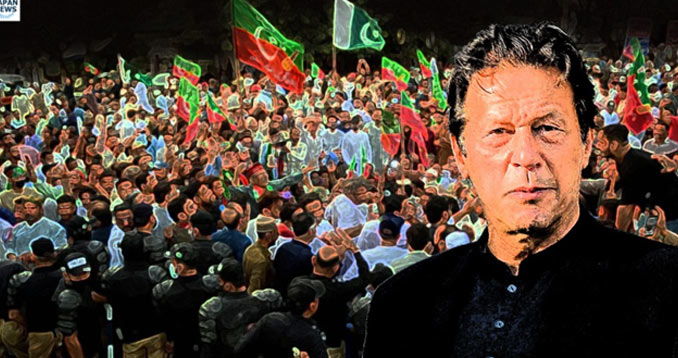

SAPAN News On May 9, a new drama unfolded in an ongoing political saga as paramilitary forces stormed the Islamabad High Court, disrupting the biometric verification process of ousted Prime Minister Imran Khan. This process was related to a case concerning his critical remarks against certain intelligence officers.
A battalion of armed personnel in riot gear dragged Khan into a waiting vehicle and drove off. They also smashed windows and assaulted his lawyer.
Khan’s Pakistan Tehreek-e-Insaf (PTI, or Pakistan Justice Movement) supporters erupted into the streets in protest at the Pakistan Rangers’ highhandedness against their leader. Violent mobs, some led by women, also stormed army garrisons and residences.
It later emerged that Khan had been ‘arrested’ under the National Accountability Bureau (NAB) Ordinance 1999 for taking millions in dollars in bribe from property tycoon Malik Riaz Hussain in a land allotment case.
The Supreme Court later declared Khan’s arrest “unlawful”. After his release and the order of a protective bail for the next two weeks, he confronted Pakistan’s powerful military head-on, saying: “I doubt there is any sense in the Army Chief right now because he’s so petrified if I win the elections I’ll denotify him… he’s dismantling the future of this country to protect himself.”
The ensuing protests resulted in injuries, damage to public property, and loss of lives. Journalists, too, faced violence and harassment from the police. A three-day ban on social media outlets aimed at stifling the spread of misinformation severely impacted various sectors and led to financial losses.
The Islamabad police estimate that the damage caused to public property has cost the national exchequer over USD 872,000. Moreover, the clashes have led to the loss of at least eight lives and hundreds injured.
Pakistan has seen mass public protests before, but never like this. The PTI’s mode of dissent shook the nation. The rioters ransacked and set ablaze the Corps Commander House in Lahore, a highly fortified bastion of historical significance. They stole items such as a golf kit, frozen strawberries, salad, a bowl of korma (meat dish) with a cold drink, and even pet peacocks, claiming these to be their ‘right’ as taxpayers.
A viral video showed a woman vigorously shaking the main door of the Army headquarters while other protesters stormed inside armed with sticks. A Pakistan Air Force base was also among the properties set ablaze.
Other objects of vandalism and arson included public buses, an ambulance belonging to the humanitarian Edhi Foundation, and police vans. In the north-west province of Khyber Pakhtunkhwa, a school was torched, besides a major interchange and the state-owned Radio Pakistan building in Peshawar.
A series of daily press releases, May 9-15, from the Inter Services Public Relations (ISPR), the information wing of the Armed Forces, termed May 9 a “dark day”. Accusing Imran Khan of a “selfish lust for power” the ISPR said that his supporters had achieved in a day what the country’s “arch-enemy” couldn’t accomplish in 75 years – a veiled reference to neighbouring India.
The state came down hard on the protestors, including women. At Lahore’s Liberty Chowk, a police officer grabbed a female protester by the hair and dragged her away after she threw her dupatta (scarf) at him. The scene was captured in a video shared on social media. Another video showed an officer dragging a woman on the ground after she refused to vacate the area. Scores of male officers barged into PTI leader Usman Dar’s house in the early hours and harassed his mother.
Hours after the ISPR’s initial statement, the police carried out a sweeping crackdown and rounded up over 200 party leaders, including various high-profile figures. Those hauled up included former foreign minister Shah Mahmood Qureshi, former finance minister Asad Umar, former information minister Fawad Chaudhry, former minister of human rights Shireen Mazari, and former minister of Maritime affairs Ali Zaidi.
The arrested leaders were booked under the draconian Maintenance of Public Order Ordinance (MPO) introduced by military dictator Gen. Ayub Khan in 1960. They can be detained for three months without legal redress.
To the question of why the protestors were given an open ground to play and lay waste to not only public and civil property but also normally well-guarded military premises, the ISPR said that the army had “without caring about its own reputation worked with extreme patience and endurance in the wider interest of the country.” It lauded the army for showing “extreme patience, tolerance, and restraint.”
Khan has been demanding early elections since his Constitutional ouster last April which many suspect of being engineered by the military. He even managed to dissolve two provincial assemblies, Punjab and Khyber Pakhtunkhwa, to generate pressure for elections. However, despite orders from the Chief Justice of Pakistan and the Constitutional requirement to hold elections in 90 days, the Election Commission of Pakistan failed to hold elections in both provinces. The government says they are waiting for financial stability before incurring the high cost of polls.
As rumours about impending martial law circulate, the army says this option is not on the table. “The army chief and army’s senior leadership are committed to upholding the continuity of democracy,” the army’s spokesperson told Geo TV.
However, observers believe that despite the change of guard at the army’s top level – the retirement of Army Chief Gen. Qamar Javed Bajwa and the appointment of Gen. Asim Munir – the military’s institutional mentality and tactics remain unchanged.
“Civilian governments are just faces that keep changing; the real power holders are the same,” says journalist Hasan Ali of The Nation. Talking to Sapan News over the phone recently, he called the army “an institution that operates with complete impunity.”
Ali was among those picked up by the police in the midst of the “revolutionary” protests in Rawalpindi. A Punjab police officer brandished a pistol at him and ordered Ali to follow him towards General Headquarters (GHQ).
“I complied, and after walking a brief distance, a man in plainclothes forcefully grabbed me and started dragging me, ripping my shirt down,” Ali told Sapan News.
He said the policeman took him to a group of security personnel comprising Punjab police and plainclothes: “One smashed me on the right side of my skull with a stick.”
A plainclothes officer tossed Ali into the police van and took him to the nearest police station. When Ali asked for an explanation, the officer said he had seen him chanting slogans. Ali denies these allegations.
At the police station, Ali explained his side of the story and showed his press credentials to the inspecting officer. The response, he says, was: “Main aap ko laya hoon?…na hi mujhe aap ko chornay ka ikhtiyaar hai.” (Did I bring you here?… Neither do I have the authority to release you). An unidentified individual then took Ali and four other detainees to the top floor of the police station, confiscated their phones, and locked them up. Ali could reach out using a small phone hidden on his person, which he used to text his parents. After securing his release, Ali returned with a lawyer for the others, but they were missing. Within hours of Imran Khan’s arrest, the government blocked Twitter, Facebook, and YouTube “indefinitely” in an attempt to combat “lies and propaganda” being spewed on social media by Khan’s party.
Such censorship is not new in Pakistan. From military dictators like Gen. Zia-ul Haq and, most recently Gen. Pervez Musharraf, to elected dispensations, successive governments have censored or banned organisations, individuals, parties, and media. A notable example is the 2012 ban on YouTube which lasted for three years after the platform refused to comply with the government’s request to remove ‘objectionable’ content.
The ban made it more difficult for the media to provide timely and accurate coverage. It also had far-reaching consequences beyond limiting access to information. The country’s freelance industry, the fourth largest in the world, has suffered a loss of $2 million per day. Not helpful, particularly for a country already experiencing a severe economic crunch.
In today’s digital age, for many, earning a livelihood is now directly tied to social media and internet access. The ban heavily impacted delivery and transport services that rely on the internet to take orders and market themselves, such as ride-hailing and food-delivery companies. Failure to respond to customers promptly can significantly impact business, comments Hamza Bhatti, a seasoned content creator based in Islamabad.
Determined social-media users circumvented the Internet ban by using VPN services to access restricted platforms. Data from Top10VPN, a website that reviews and rates VPN services, shows a significant increase in demand on May 9-11, skyrocketing to over a thousand percent (1,329%) compared to the preceding 28-day daily average, which the research does not mention.
According to the estimates of Netblocks, an organisation that monitors internet connectivity worldwide, the country faces a staggering loss of $53 million per day due to the ban on internet services.
Since Pakistan’s birth over 75 years ago, it is the ‘establishment’ that has largely determined who gets political power and when to take it away. Out-of-favour politicians get disqualified from political office, imprisoned, or exiled. Some have been killed.
Now, with their leader ousted, Imran Khan’s supporters are expressing their rage not politically but through violence and vandalism. The state’s response to try them through military courts will only worsen the situation. Whether or not this episode will feed into the democratic political process or further entrench the military in power behind the scenes, only time will tell.
Abdullah Zahid is an aspiring journalist studying mass communication at the University of Karachi. Follow him on Twitter @AbdullahZahid
Published in:
- South Asia Monitor, Pakistan: The military versus the people, 23 May 2023
- in, Pakistan: Imran Khan’s arrest was followed by a crackdown – what does it mean for democracy?, 24 May 2023

Leave a Reply